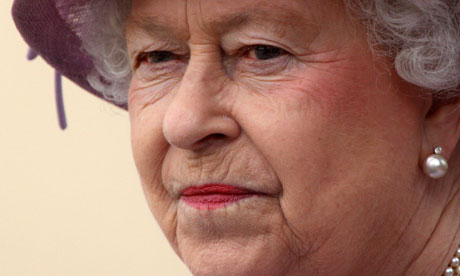Queen to visit Irish Republic by end of next year
Visit will be first by a British monarch since George V in 1911 at time of Home Rule crisis

The Queen is to make a historic first visit to the Irish Republic before the end of next year. The last monarch to visit Ireland was George V, who went to Dublin in 1911 at the time of the Home Rule crisis, when the country was still part of the UK.
The taoiseach, Brian Cowen, made the announcement after meeting David Cameron at 10 Downing Street. Cowen said there had been a clear transformation in the relationship between Ireland and Britain, which should be reflected in normal diplomatic relationships.
The visit will be opposed by a number of republican dissident organisations. Republican Sinn Féin has vowed to bring demonstrators on to the streets of Dublin if the Queen visits the Irish capital.
Security will be extremely tight for the groundbreaking royal visit. The last major attack in Dublin on a British establishment target was in July 1976, when the Provisional IRA assassinated the UK's ambassador to Ireland, Christopher Ewart-Biggs. He died after his car was blown up by a landmine near his residence in south Dublin.
The Ewart-Biggs murder led to a crackdown in the Republic with the then Fine Gael-Labour coalition declaring a state of emergency. His widow, Jane, later declared that she had no bitterness towards the Irish people and launched a peace prize in her husband's name.
The Irish National Liberation Army almost murdered his successor several years later but a bomb near his pew in Dublin's Anglican cathedral failed to detonate.
Prince Charles is the most senior royal to have visited the Republic. His trip to Dublin was marked by violent demonstrations by republican groups. During protests outside Trinity College Dublin, which the prince visited, demonstrators threw potatoes in memory of the Irish potato famine.
(Reuters) - Irish Prime Minister Brian Cowen invited Queen Elizabeth to visit Dublin, saying improvements in bilateral relations had opened the way for a first trip to the republic by a British monarch.
The island of Ireland, previously ruled by Britain, was split in the 1920s into a Free State comprising 26 counties while 6 counties remained part of the United Kingdom. The Free State later became the Republic of Ireland and the northern counties became Northern Ireland.
A conflict between mainly Catholic militants fighting for a united Ireland and predominantly Protestant groups backing Northern Ireland's union with Britain killed 3,600 people, in the last three decades of the 20th century.
A peace agreement in 1998 largely ended the violence and the British and Irish governments now closely cooperate to suppress militant activity which has intensified again since last year.
"No obstacle now exists ... for those normal courtesies of friendly neighbouring states exchanging visits through heads of state," Cowen told Irish national television RTE after meeting his British counterpart David Cameron in London.
"I think that would be a good development," Cowen said of a visit by the Queen. "It's timely now that we move on in this relationship."
Cowen said the visit might be before the end of Irish President Mary McAleese's term in office at the end of 2011.
A Buckingham Palace source said they do not comment on the Queen's travel plans in advance.
All mainstream Irish parties support the peace process but some nationalist groups declared their opposition to such a visit by Queen Elizabeth.
"Sinn Fein opposes the proposed state visit of the Queen of England, Commander-in-Chief of the British armed forces," said the party which is a small opposition force in the republic's parliament and a joint leader of Northern Ireland's regional executive.
"Until there is complete withdrawal of the British military and the British administration from Ireland ... no official welcome should be accorded to any officer of the British armed forces of any rank," Caoimhghin O Caolain, the leader of Sinn Fein deputies in the lower house in Dublin, said in a statement.
(Reporting by Andras Gergely in Dublin and Avril Ormbsy in London; Editing by Matthew Jones)

No comments:
Post a Comment